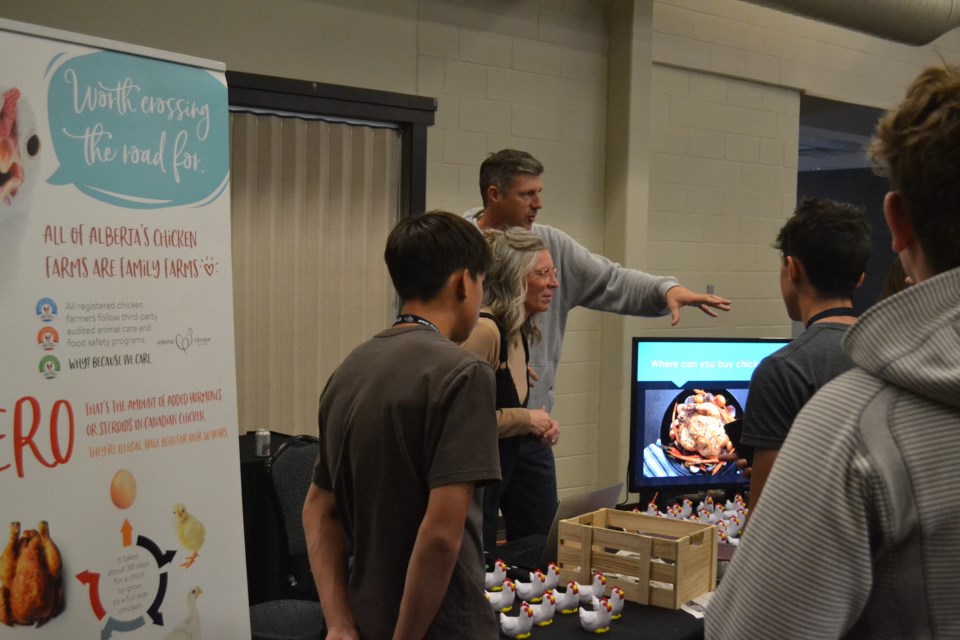OLDS — Nearly 110 teachers and students from across Alberta came to the Olds College of Agriculture and Technology Oct. 20-23 to learn firsthand about the diversity of agriculture.
Students attended seminars, a trade fair and toured nearby farms.
The event was called Cultiv8, and it was organized by Inside Education, an organization funded by the federal and provincial governments as well as various corporations and foundations.
It holds conferences to enable youth to gain insight on various aspects of education.
The Olds event was the 11th staged by the organization, which has existed since 1985.
This time the focus was on agriculture. Next spring’s summit will be in Canmore, when the focus will be on energy and climate change.
“This is the second time we’ve held Cultiv8 agriculture summit at Olds College. The last one was – believe it or not – March 2020, right before everything sort of went off the rails,” Steve McIsaac, executive director of Inside Education, said during an interview with the Albertan.
“We come to Olds – to the college -- probably because it’s world renowned, state of-the-art, and so many things we can see and do.
“But we try to move it around and have it as an opportunity for people to see different parts of the province and experience what's happening provincewide.”
Students from 18 high schools from as far north as Fort McMurray and as far south as Milk River attended the conference, but according to McIsaac, no students from Mountain View County or surrounding area were among them.
One of the more intriguing stories at the conference was that of a school operating as a farm near Airdrie called simply “The Farm.”
It’s run by Grade 9 teacher Mark Turner and Grade 10 teacher Matt Chomistek.
A total of 56 students are enrolled; 28 in each grade. Each day, the students take classes at The Farm, then go back to their regular schools for sports or club activities.
The Farm began operations in September, 2019.
"We got the idea in early 2018 when (we) approached the school division and asked how can make schooling more engaging," Turner told the Albertan.
Turner said the program is so popular that last year, 65 students applied for 28 seats.
He said the hope is to eventually offer the program to students all the way through Grade 12, but added that’s a decision for the school division in the area.
"The mission is really simple. It’s to teach them where their food comes from,” he said.
“We’re on a 15-acre spot where we raise a wide variety of different animals with them. So we have pigs, we have chickens, we have lambs. We’ll be having alpacas in a couple of weeks here.
“When we ask them that question, where does their food come from? Most of them don’t know. They will sit there and say Superstore or Sobeys or whatever. So for us, that’s what we kind of explore throughout the year.”
Students take regular courses like math and science, but also fit in chores like feeding the animals and building pens to house them.
They also go on field trips to nearby farms occasionally to learn more about the industry.
Turner said part of that education is learning that raising animals on a farm doesn’t mean they’ll be with you forever.
“All of our animals – I mean, other than our layers, our chickens – they’re going to be processed,” Turner said.
“So if you get a pig and you name it Wilbur, Wilbur will be processed, because that’s what we’re here to learn about.”
The students don’t butcher them though. Turner says due to government regulations, he transports the animals to butchering facilities in Strathmore when the time comes.
Turner was asked if he was raised on a farm himself.
“I don’t come from an ag background at all,” he said. “I’m just a teacher who thinks that school should change.
“I want our students to walk away appreciating who the farmers are who do raise the livestock, to realize the amount of effort and work it does take into that because I think we kind of take our food sector, our food industry, for granted in what they do.”



